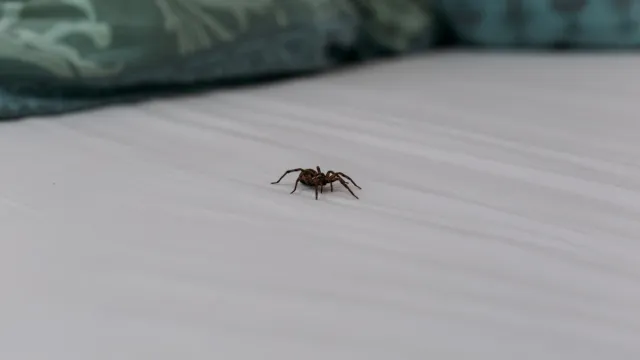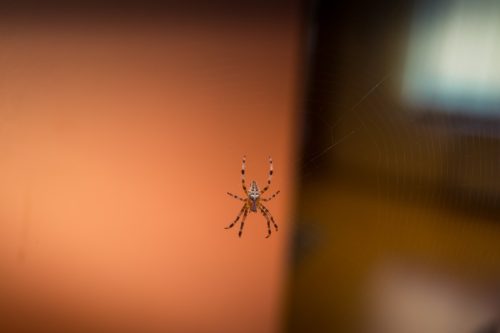Doing This at Night Could Be Inviting Spiders Into Your Bed, Experts Warn

For most of us, there’s a simple fact that’s hard to avoid: Spiders are scary. Yes, they offer important benefits by preying on other insects, but those eight legs are downright unsettling. These creepy crawlers often end up inside your home, where you’ll likely find them in places they can spin their webs undisturbed. But even if spiders don’t scare you when you spot them, you’d probably rather avoid letting them share your bed. As it turns out, you could be sending these unwanted intruders an invitation. Read on to find out what bedtime habit experts say rolls out the welcome mat for spiders.
READ THIS NEXT: If You Keep This on Your Bed, You May Be Attracting Spiders, Experts Warn.
Different parts of your bedroom already attract spiders.

Unfortunately, many things in your bedroom and on your bed could be attractive to spiders, including long throw blankets, oversized bedspreads, bed skirts, and dust ruffles. These can act as a ladder from the ground to your bed, which spiders can easily take advantage of, according to Terminix.
Clutter under your bed could create additional problems, as messy areas provide plenty of nooks and crannies for spiders to hide in. And while you may want to strip your bed or clear out any stray socks underneath, experts advise reconsidering another nighttime practice that may be enticing to spiders.
Be careful when adjusting the temperature before getting into bed.

If you find yourself turning up the thermostat before climbing into bed, you could be making your room that much more appealing to spiders. On the flip side, if you prefer to sleep in cooler temperatures and generally turn the thermostat down a few degrees, it could help keep spiders at bay.
“Different spiders are attracted to different environments, but the majority appreciate a dry, temperate climate,” Jeremy Yamaguchi, CEO of Lawn Love, says. “Spiders cannot regulate their body temperature, so a cold environment means sluggish spiders.”
Spiders are also likely to make their way inside after it rains to get away from cold and damp environments—which they don’t like. “If you want to keep spiders away at night, freezing them out is definitely an option,” Yamaguchi says.
For more home advice delivered straight to your inbox, sign up for our daily newsletter.
Spiders prefer warmer temperatures.

According to Nick Rohe, technician for Truly Nolen Pest Control, spiders prefer balmier temperatures, as warmer environments attract insects, which spiders eat.
“They typically make their webs in areas that are considered ‘high traffic’ for their prey,” Rohe says. “Sometimes, those areas are inside of our houses.” Spiders like their privacy, preferring to be “undisturbed,” which is why you frequently find them lurking in garages or storage closets, he adds.
But if your room is the warmest room in your home, they could start exploring. Warmer temperatures are better for spiders’ hunting and feeding habits, as well as mating and laying eggs, Phi Dang, director of Sidepost, a home services company, says.
Experts offer different strategies to keep spiders out of your bedroom.

Experts debate what temperature would be necessary to keep spiders out—and they could still end up in your bedroom no matter how much you fiddle with your thermostat. According to Zackary DeAngelis, CEO and founder of Pest Pointers, LLC, spiders are biologically inclined to survive in the cold, and below-freezing temperatures would be the only way to deter them with 100 percent certainty.
But while turning the air conditioning down may not be a foolproof plan to deter spiders from moving in, a lower thermostat can still have its perks. “The colder it gets in your home, the more likely it is that the spiders in your house will move less and less to preserve energy, which will keep them away from you,” DeAngelis says.
The pest expert also recommends taking precautions to prevent spiders from getting in in the first place, including sealing outside entrances, checking that windows are screened, keeping trash away from ways into your home, and keeping your house clean.
READ THIS NEXT: Leaving This One Thing in Your Bathroom Is Attracting Spiders, Experts Warn.